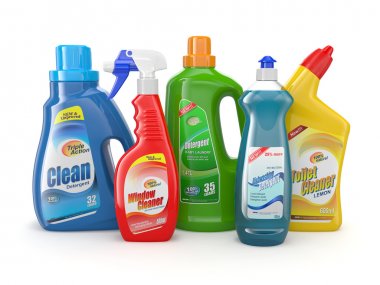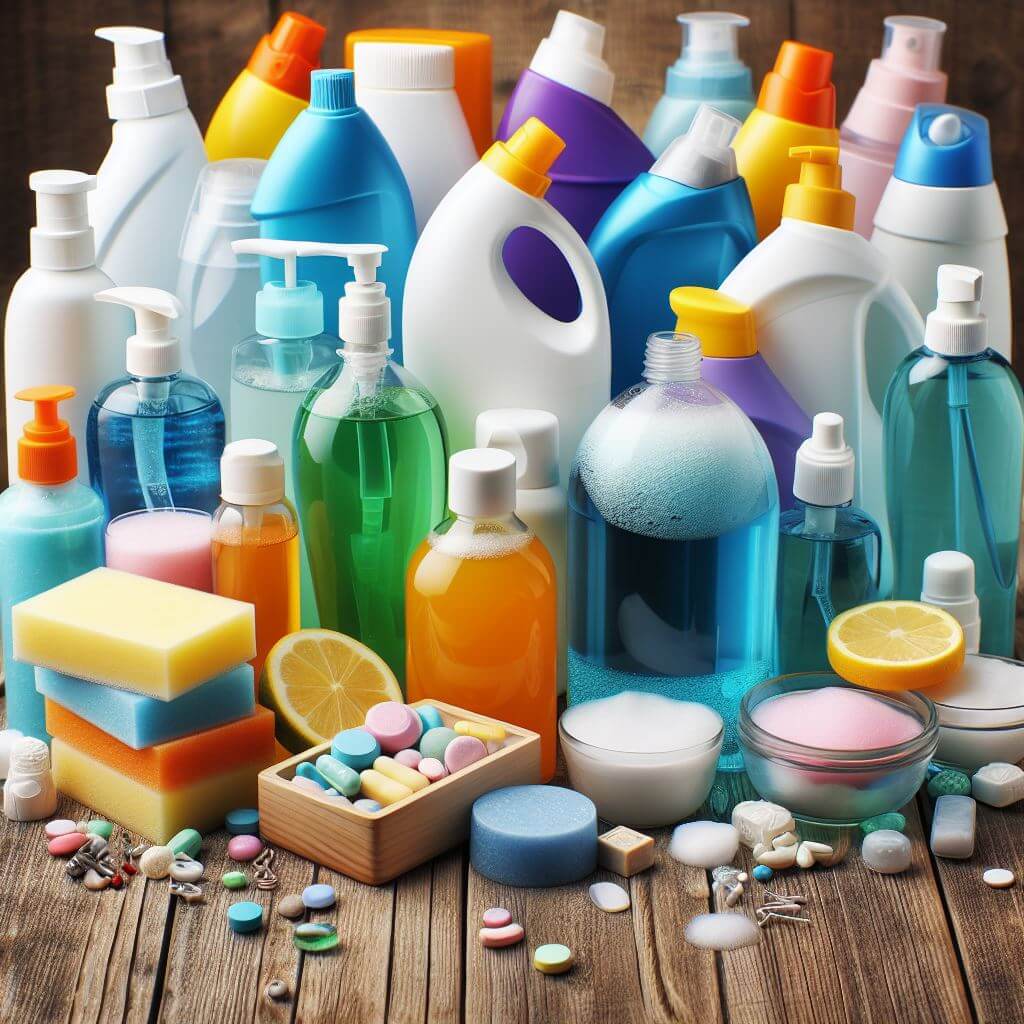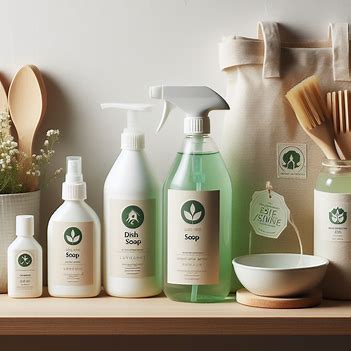- Home
- Natural Cleaning Agents
- Common Household Chemicals That Have an Environmental Impact
What Are Some Common Household Chemicals That Have an Environmental Impact and How to Mitigate It
Everyday, your home might be contributing to environmental harm without you even knowing it. Household chemicals, found in products like cleaners and detergents, can cause health issues ranging from respiratory problems to more serious conditions. These chemicals not only affect human health but also harm aquatic life and disrupt the food chain. But there's hope! By choosing eco-friendly cleaning products, you can promote healthier indoor air and protect the environment.
To mitigate the negative impacts of harmful chemicals, it's crucial to become more conscious of the products you use. Start by reading labels and opting for alternatives that don't contain toxic substances. By doing so, you'll not only safeguard your family's health but also contribute to a healthier planet. Remember, every small action counts when it comes to environmental protection and ensuring the well-being of future generations.

Understanding the Impact of Household Chemicals on the Environment
Household chemicals play a significant role in polluting our planet. When these substances enter waterways, they can devastate aquatic life and climb up the food chain, ultimately impacting human health. Moreover, many of these harmful chemicals persist in the environment, leading to long-term health issues. By adopting eco-friendly cleaning practices, you can help reduce this impact and contribute to a healthier planet for all.
1. The Role of Everyday Products in Water and Air Pollution
Did you know that the cleaning supplies you use can be major health hazards? These products often release pollutants into the air and water, contributing significantly to environmental pollution. This emphasizes the importance of carefully selecting the products you bring into your home.
How Chemicals Enter Waterways and Affect Aquatic Life
Household chemicals find their way into rivers and oceans through drainages and sewage systems. Once in the waterways, they can have a devastating effect on aquatic life, disrupting ecosystems and poisoning water sources. This chain of contamination affects not only marine creatures but also the quality of water humans rely on.
Indoor Air Quality and Chemical Exposure Risks
The use of chemical-laden products indoors can significantly increase health risks, including allergic reactions and respiratory problems. These risks highlight the importance of maintaining cleaner, healthier indoor air by opting for natural or less harmful products.
Common Environmental Culprits in Our Homes

In almost every home, common household items contribute to environmental degradation. Recognizing these culprits is the first step toward making more sustainable choices.
1. Detergents Containing Phosphates and Their Role in Eutrophication
Laundry detergents with phosphates are a major concern as they lead to eutrophication, naturally and essentially choking the waterway with excessive plant growth. Opting for a phosphate-free laundry alternative can significantly mitigate this issue, protecting water quality and aquatic life.
2. The Double-Edged Sword of Antibacterial Gels and Soaps
Children who grow up in overly sanitized environments and frequently use antibacterial gels and soaps may end up with weaker immune systems than those who grow up with regular exposure to germs. This overuse can contribute to the development of superbugs, which are harder to defeat and pose a significant health risk.
3. Chlorine Bleaches: A Potent Source of Toxic Release
Chlorine bleach, a corrosive chemical commonly found under kitchen sinks, is incredibly dangerous and many argue unnecessarily. Its toxic release can be more harmful than the germs it was invented to get rid of, posing serious risks to both human health and the environment.
4. Microbeads and Their Journey to the Oceans
Microbeads, used in body scrubs and abrasive cleaners, have led to significant environmental harm, prompting a ban on all cosmetics containing microbeads. These tiny particles pollute waterways and harm marine life, highlighting the need for biodegradable alternatives.
5. Wet Wipes: Convenience at an Environmental Cost
Despite their convenience, wet wipes pose a substantial environmental threat. Often containing plastic, they do not decompose easily and clog water systems. Opting for a fabric cloth and cleansing with a flannel can be a more sustainable choice.
6. The Persistent Problem of Single-Use Plastics
To combat the problem of single-use plastics, consider eschewing all plastic packaging where possible. This can involve bringing your bags to the supermarket or shopping at local farm shops, significantly reducing your environmental footprint.
Reducing Household Chemical Footprint

Reducing your household's chemical footprint involves making conscious choices about the products you use and their impact on the environment.
1. Alternatives to Environmentally Harmful Cleaning Products
Choosing alternatives to harmful cleaning products is crucial for environmental protection. The Environmental Protection Agency highlights how certain products can harm the environment and persist, affecting the food chain and overall ecosystem health.
The Benefits of Eco-Friendly Cleaning Products
Switching to eco-friendly cleaning products can significantly benefit both human health and the environment. Common household chemicals in traditional cleaners can cause allergic reactions and other health issues. Eco-friendly options contribute to a healthier living environment and have a lesser impact on the environment, helping to preserve it for future generations.
Making Smarter Choices: Beyond the Label
Choosing household chemicals wisely involves looking beyond flashy labels and marketing claims. It's crucial to understand how these products can affect human health, cause allergic reactions, or harm the living environment. Start by opting for products with fewer ingredients and those labeled as eco-friendly, as they generally have a lesser impact on the environment. Remember, a safer home and a healthier planet begin with informed choices.
2. Innovation in Cleaning: The Promise of Nanotechnology
Nanotechnology is revolutionizing how we approach household cleaning, offering solutions that minimize environmental harm. By manipulating substances at the molecular level, nanotechnology can create household chemicals that are efficient yet less damaging to our ecosystems.
How Nanotechnology Creates Less Harmful Cleaning Solutions
Nanotechnology has the potential to significantly reduce how cleaning products harm the environment. Innovations in this field can lead to chemicals that don't persist in the environment, as confirmed by the Environmental Protection Agency. Such advancements promise a future where cleaning aids degrade more completely, lessening their impact and safeguarding aquatic life and natural habitats.
Navigating the Waters of Change
The transition to greener household cleaning practices is an evolving journey. It requires a commitment to learning about the environmental impacts of our choices and a willingness to adopt more sustainable habits. By embracing eco-friendly products and methods, you can contribute to a cleaner, healthier world.
1. Individual Responsibility in Mitigating Environmental Impact
Your choices in household chemicals play a pivotal role in environmental conservation. Opting for eco-friendly cleaning products can reduce the growth of algae in water bodies and lessen the burden on treatment facilities, showcasing how individual actions can make a real difference.
Practical Steps to Reduce Your Chemical Footprint at Home
Reducing your chemical footprint starts with simple, practical steps. Choose products with natural ingredients, recycled packaging, and limit the use of harsh chemicals. Consider homemade cleaning solutions using everyday items like vinegar and baking soda. These small changes can significantly lower your environmental impact and contribute to a healthier home and planet.
More on natural cleaning agents
2. The Role of Regulations and Corporate Accountability
Regulatory measures and corporate responsibility are crucial in guiding the industry towards more sustainable practices. By setting standards for the production and labelling of household chemicals, we can ensure a transparent and environmentally responsible market.
How Consumer Choices Can Drive Greener Practices in the Industry
Your buying decisions have the power to influence the industry. By prioritizing environmentally friendly products, you signal to companies the importance of sustainability. This consumer pressure can lead to greater innovation in green technologies and a shift towards more responsible manufacturing and packaging practices for household chemicals.
Frequently Asked Questions about Household Chemicals and the Environment
Many wonder about the impact of household chemicals, such as floor cleaners, on our planet. These products can contain harmful substances that threaten aquatic ecosystems and human health. By choosing greener alternatives, you can help mitigate these risks and protect the environment.
1. Can Eco-Friendly Products Truly Make a Difference?
Yes, eco-friendly products can significantly reduce the environmental footprint of household chemicals. By minimizing toxic runoff and air pollution, these alternatives support a healthier ecosystem and promote sustainable living practices, proving that small changes can yield big results.
2. How Do I Start Transitioning to Greener Alternatives?
Beginning your journey to greener alternatives involves educating yourself on the health and the environmental impacts of traditional products. Look for items with fewer chemicals to avoid adverse effects like skin and eye irritation. Start with one product and gradually expand to others, making sustainability a guiding principle in your purchasing decisions.
3. Addressing Common Myths About Green Cleaning Products
Some believe green cleaning products aren't as effective as traditional household chemicals. However, natural ingredients like baking soda and vinegar can be powerful allies in cleaning and disinfecting. Additionally, eco-friendly air fresheners can maintain a pleasant atmosphere without compromising air quality, debunking myths about the efficacy of green products.
Taking Action for a Healthier Planet
Every action you take, no matter how small, contributes to a healthier planet. By adopting greener practices in your daily life, you support environmental sustainability and promote a healthier future for all.

Simple Changes, Significant Outcomes
Implementing simple changes in your routine can lead to significant environmental benefits. Opting for reusable items, reducing waste, and choosing eco-friendly products are steps everyone can take to make a positive impact.
Embracing a Greener Lifestyle Beyond Cleaning Products
Adopting a greener lifestyle extends beyond just cleaning products. Consider the broader impact of your choices on health and the environment. From reducing plastic use to supporting sustainable brands, every decision can help mitigate adverse effects and promote a healthier, more sustainable world for future generations.
The Ripple Effect of Informed Consumer Choices
When you choose eco-friendly products, you're not just making a small change; you're sparking a big movement. By picking alternatives to household chemicals that are harmful, you're supporting companies that prioritize the planet. This demand leads to more sustainable practices industry-wide, showing that every purchase has the power to shape a greener market.
A Cleaner Future Starts in Our Homes
Your journey to a healthier environment begins with the cleaning agents under your sink. By selecting products that are safe and eco-friendly, you're not only protecting your family's health but also reducing the harmful chemicals that enter our waterways and soil. This simple switch in your home can lead to a significant decrease in pollution and contribute to a cleaner future for all.
The Collective Power of Individual Actions
Every can of aerosol you decide not to use reduces the environmental impact of cleaning and supports the health in our homes. This collective action can drive substantial changes, proving that our choices have the strength to affect the world around us.
Beyond the Bottle: The Journey to Environmental Stewardship
Opting for environmentally friendly household chemicals is just the beginning. It's a step towards understanding that every product we use has a lifecycle and an impact. By educating ourselves and making conscious choices, we embark on a journey towards environmental stewardship, where we not only minimize harm but also contribute to the planet's well-being.